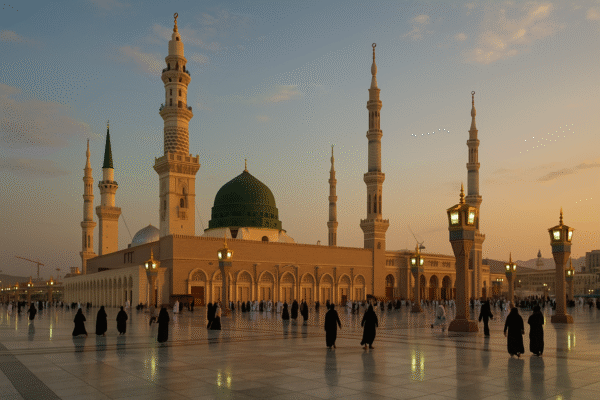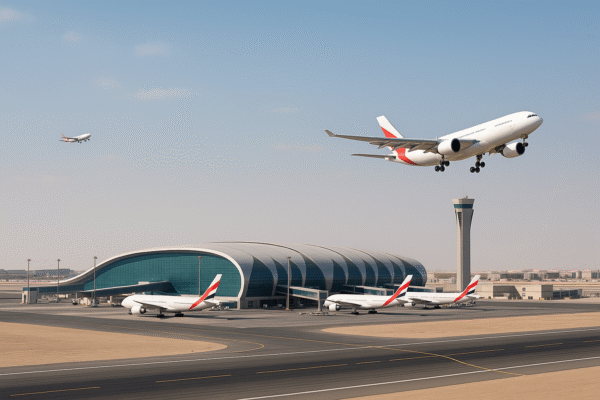The global Muslim travel market is witnessing an unprecedented transformation—and the Middle East is at the heart of this revolution. Saudi Arabia, the United Arab Emirates, Qatar, Oman, Kuwait, and Bahrain are reshaping the landscape of Halal travel by going beyond the basics. Today’s Muslim travelers are no longer just seeking Halal food and prayer facilities; they want experiences that are sustainable, inclusive, and authentically connected to their values and identity.
Saudi Arabia: Faith-Driven Tourism Anchored in Sustainability
As part of its ambitious Vision 2030, Saudi Arabia is making massive strides in tourism diversification. The government is investing billions in transforming the Kingdom into a global destination for eco-conscious Muslim travelers.
One of the highlights is the Red Sea Project—a luxury, regenerative tourism development that blends sustainability with Islamic values. With solar-powered resorts, marine conservation zones, and carbon neutrality targets, the project is redefining pilgrimage and leisure.
Saudi Arabia is also focusing on inclusive travel. From Hajj packages designed for elderly and disabled pilgrims to initiatives empowering solo female Muslim travelers, the Kingdom is embracing a holistic and inclusive approach.
UAE: Dubai and Abu Dhabi at the Forefront of Smart and Green Travel
The United Arab Emirates has long been a magnet for international travelers, and now it’s becoming a role model in Muslim-friendly tourism. Dubai and Abu Dhabi are implementing green tourism solutions, including solar-powered public transport, energy-efficient hotel infrastructure, and AI-driven apps that offer personalized Muslim travel experiences.
Dubai International Airport is also advancing in sustainable aviation, aligning with the broader national strategy of reducing the carbon footprint in tourism.
A standout feature in the UAE’s tourism strategy is inclusivity. Attractions like Global Village and Dubai Parks and Resorts offer sensory-friendly experiences for neurodivergent visitors. Safety, digital convenience, and cultural respect have made the UAE a favored destination among Muslim solo female travelers.
Qatar: Blending Technology, Faith, and Sustainability
Fresh from hosting the 2022 FIFA World Cup, Qatar has positioned itself as a global innovator in faith-based sustainable tourism. The country’s strategy emphasizes carbon-neutral infrastructure, green stadiums, and smart mobility.
Qatar Airways remains one of the most Muslim-friendly airlines globally, offering onboard Halal options, Qibla direction indicators, and prayer facilities.
Qatar has also become a top destination for accessible and inclusive travel. From dedicated spaces for neurodivergent travelers to wellness-focused resorts for Muslim women, the nation is pioneering personalized Halal tourism.
Oman: Cultural Depth Meets Eco-Tourism
For Muslim travelers seeking authenticity, Oman offers a slower, culturally rich alternative. Its ancient forts, traditional souks, and stunning natural reserves are part of a growing eco-tourism network that respects both nature and heritage.
Government-backed initiatives encourage the development of low-impact resorts, protection of endangered species, and community-based tourism. Oman is also regarded as one of the safest destinations for Muslim women, with dedicated women-led tours and respectful hospitality ingrained in its tourism services.
Kuwait: Nurturing a Boutique Halal Travel Market
Kuwait is leveraging its deep-rooted Islamic heritage and modern infrastructure to attract Muslim travelers. Though smaller than its neighbors, Kuwait is investing in green-certified accommodations, digital Halal travel platforms, and inclusive urban planning.
With accessible museums, Halal culinary tours, and eco-parks, Kuwait is positioning itself as a niche yet meaningful destination in the Halal tourism sector.
Bahrain: Family-Friendly Heritage Tourism
Bahrain is balancing modern leisure with Islamic values to appeal to a broader segment of Muslim travelers. Known for its cultural festivals, historic mosques, and Islamic art centers, the kingdom is focusing on multi-generational travel.
From eco-resorts in the Hawar Islands to accessible features in public attractions, Bahrain is enhancing its appeal to Muslim families and faith-conscious tourists. The country’s Formula 1 Grand Prix has also embraced inclusivity by incorporating prayer facilities and Halal zones for international guests.
The Middle East: A Blueprint for the Future of Muslim Tourism
Collectively, these GCC countries are setting a global benchmark in values-driven travel. By incorporating smart technologies, faith-aware services, and eco-conscious practices, they are addressing the evolving needs of a young, tech-savvy, and ethical Muslim population.
According to the Global Muslim Travel Index (GMTI) by Mastercard and CrescentRating, Muslim travel is projected to reach 230 million travelers by 2028, up from 160 million in 2019. With strategic initiatives in place, the Middle East is primed to capture a significant share of this burgeoning market.
Conclusion
The Muslim travel experience is being redefined—no longer just about compliance, but about connection, consciousness, and cultural engagement. The Middle East is leading this movement by creating spaces where faith and modernity coexist, offering travel that is enriching, respectful, and responsible.
As sustainability and inclusivity become non-negotiable for travelers worldwide, the region’s strategic foresight ensures that the Middle East remains the epicenter of the global Halal tourism future.
For more travel news like this, keep reading Global Travel Wire














